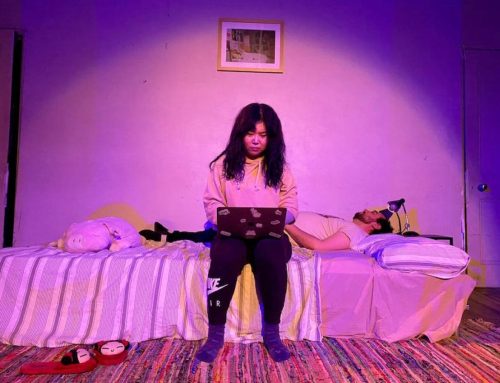At the outset of writer and director Gabrielle Silvestre’s Des Fleurs, the central character Judith (Harriet Whitbread in a strong performance that offers one of the evening’s few positive distractions) sits alone in the unkempt garden of her rickety home counties house. She is drinking tea and poring over Nancy Mitford’s 1945 book The Pursuit of Love. The choice of reading material is presumably directorial foreshadowing of the play’s central theme, but if only this play had one tenth that novel’s tragic humour. This is meagre fare, unaided by poorly thought-through writing.
Judith has incipient dementia. In the aftermath of the death of her husband John (played as a young man by Samuel Hoult), her progeny, pushy and impatient Emma (Naomi Hyatt-Golding) and her feeble brother Sam (Nadav Burstein), demand that mum moves into a care home. Lurking in the background like an unwelcome apparition is Judith’s sister-in-law, Faye (Laima Helena Vanaga), whose only perceptible function in the narrative is to make tea. But Judith is desperate to stay in her house, permeated as it is with a lifetime of bittersweet memories. Most pressing of her reminiscences are reflections on what might have been decades past, had she chosen a romantic life with best friend Georgia (Libby Boyd), rather than dull accountant John.
The central storyline, a kind of Sussex rendition of Ang Lee’s seminal 2005 movie Brokeback Mountain, never really comes to anything, mainly because the story is lacking in believable conflict and Silvestre’s characters are so thinly drawn. Judith has some sort of personality, if only because she is defined by the (fairly inexplicable) central choice she makes as a young woman. But none of the other characters have more than one dimension. The women are mostly there to bounce off Judith, foils without motivations or a journey of their own. The men are semi-redundant ciphers whose only concern is to assure Judith that she is loved. A second storyline which looks at the inclination of children to put the elderly in care because it is convenient for them, rather than their parents, shows promise but fizzles out way too early.
The alternation in narrative timelines sees older, dementing Judith periodically look back on her vivacious and love-struck younger incarnation (Sophie Macdonald). It is a neat trick if you can make it work. The problem here is not the writer’s ambition or even the potential for dramatic interest, it is in execution and writing. Silvestre seems to be aiming for a naturalistic style of dialogue that captures the minutiae of middle-class England, but the endlessly repetitive ‘how are you?’ and ‘would you like a cup of tea?’ questions that she puts in the mouths of her characters stop any nascent dramatic momentum in its tracks. Just like Judith’s garden roses, the script needs pruning and fertilising.
Writer and Director: Gabrielle Silvestre
25 October 2022
Duration: 70 minutes, no interval.

More Recent Reviews
Playfight. Soho Theatre.
Writer Julia Grogan’s breathtakingly assured debut play arrives at Soho Theatre following stellar reviews at the Edinburgh Fringe and [...]
All The Happy Things. Soho Theatre.
Naomi Denny’s three-hander comedy-drama All The Happy Things covers familiar themes within a recognisable premise. A grieving protagonist comes [...]
Telly. Bread and Roses Theatre.
The challenge with absurdist comedy is that many people do not find it funny. Laughing at the sheer weirdness [...]




